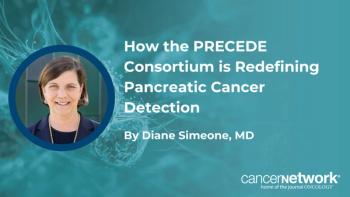
Building the Foundation of a Successful Surgical Oncology Career
Alessio Pigazzi, MD, PhD, FACS, FASCRS, provides advice for upcoming surgeons starting out in the colorectal cancer field.
Institutional and colleague support, as well as resisting the fear of trying new things, are paramount to establishing a successful medical career, according to Alessio Pigazzi, MD, PhD, FACS, FASCRS.
CancerNetwork® spoke with Pigazzi, executive medical director of Surgical Services, the vice chair of Clinical Network Surgery in the Department of Surgery, and clinical professor in the division of Colorectal Surgery at City of Hope Orange County, about his recent appointment as executive medical director of Colorectal Surgery by City of Hope Orange County. The appointment came 20 years after Pigazzi performed the first robot-assisted tumor removal for rectal cancer.
Pigazzi provided his own advice for newcomers to the colorectal cancer field. The first piece of advice he gave was to prioritize earning support from colleagues and the institution. He followed up by suggesting that factors such as location and salary should not be the primary sources of motivation early on in one’s career.
The second piece of advice that Pigazzi gave was to resist the fear of trying new things, particularly as it relates to problem solving. He suggested challenging standard or acceptable ideas in a rigorous and scientific fashion. Pigazzi stated that these pieces of advice formed the foundation of a successful in career in medicine, but also said that they can be applied to any field as well.
Transcript:
I get asked by my trainees frequently [about advice on working in the field]. The best advice I can give is to try to choose a job based on the support that you will get from your colleagues and from the institution. Do not sweat too much [about] the location, the salary, and these practical things that, especially at the beginning of one’s career, should not be the main drivers of a career decision. The second piece of advice is to never be afraid to try new things. Think of a problem and think of a creative solution to it. Do not be afraid to stretch the limits a little bit of what is acceptable, what is standard at the time, and where you conceive these ideas, but do so rigorously and scientifically. That is the foundation of a successful career in medicine and in any field.
Reference
City of Hope Orange County appoints Alessio Pigazzi, M.D., Ph.D., as Executive Medical Director, Colorectal Surgery. News release. City of Hope. August 20, 2024. Accessed September 4, 2024. https://tinyurl.com/2342bxwa
Newsletter
Stay up to date on recent advances in the multidisciplinary approach to cancer.










































